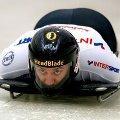Zach Lund is eager to prove that he is the best - not to himself, but to everyone else. "To me in my heart, I know I am an Olympian. I know what I have accomplished already. If you ask me right now I say, 'Yes, I am. ' Am I, officially? No," Lund said. After 54 years, skeleton returned to the Olympics in 2002, and athletes again braved the dangers of sliding head first on a small, simple sled at numbing speeds down a long and twisting track of ice. A former luge competitor, Zach Lund barely missed being a part of the U.S. Skeleton Team that year. But before the 2006 Games in Turin, he was the best U.S. chance for gold as the world's top ranked slider. Lund was finally on the sport's biggest stage, only to miss his opportunity by a whisker, or more appropriately, by the remaining hair on his head. Lund had tested positive for finasteride, a substance that was in the hair restoration product he was using. He was unaware it had been added to the list of prohibited substances in 2005, and said he had declared its use on the doping control form he submitted for every drug test.
Because finasteride was considered a steroid masking agent, Lund was given a one-year suspension by the Court of Arbitration for Sport. The decision came just before the Turin Opening Ceremonies. With no immediate recourse, Lund voluntarily surrendered his Olympic credential and left the Olympic Village after an unsuccessful appeal.
Canadian Dick Pound was the head of the World Anti-Doping Agency (WADA) at the time, and Canada had several top skeleton racers. Lund believes motivations other than doping enforcement may have led to his ouster.
"I happened to be number-one in the world," he recalled. "And it happened to be a few people behind me were of a certain nationality. And with me out of the way, it makes sense. And it so happens that country won gold and silver. That is why I feel it happened." The CAS panel of three arbiters appeared sympathetic with his argument and said it was "entirely satisfied that Mr. Lund was not a [drug] cheat. " But WADA stressed that athletes are responsible to know what substances are on the prohibited list. Lund continued to fight his case. While he says the process is still far from perfect, some change has come as a result of his situation.
"So at least now, if someone is taking something and they do not know it like I was, at least know they will get a phone call," he explained. "Because if I got a phone call that year that said 'this is in your form, but it is not coming up on your test. That is illegal. You need to stop. ' Then this would have never happened." Lund was determined to regain his competitive stature. He won the World Cup overall title in 2007 by claiming four of eight races and setting the track record at the Olympic course in Turin exactly one year after his ordeal began.
Then in 2008, finasteride was removed from the list of banned substances. Instead of celebrating, Lund's anger grew because he felt the anti-doping agency had not done its job in the first place. "That was a huge kick in the gut last year," he added. "To know in my heart that I was not going to cheat. To know that I made an honest mistake. To know that I did nothing wrong. I won my case, but I still had those certain people in the media who still say that, 'He is a cheater.'" Even with finasteride no longer banned, the sting of accusations lingered and dominated his thoughts. Lund asked WADA to clear his record. But he says his request was ignored, and he subsequently lost interest in racing. His world ranking plummeted.
Eventually, with a close friend's encouragement, Lund began training hard again. He is currently near the top 10 in the world standings. And he has shaved his head. Gone with his hair is the vanity that led to his unintended journey.
Zach Lund is ready for the Vancouver Olympics. His ultimate vindication may come from winning a medal in Canada, or simply from the knowledge that by competing he is a true Olympian.

